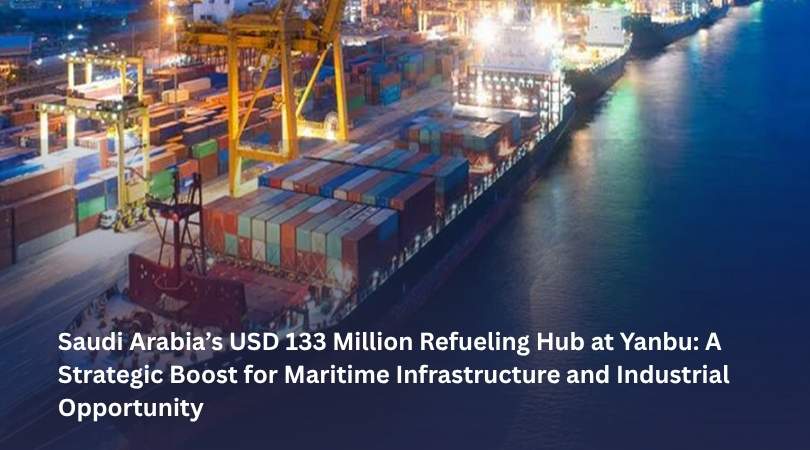Saudi Arabia is taking a significant leap in enhancing its maritime logistics sector through the launch of a USD 133 million integrated ship refueling hub on 6ht August 2025 at the King Fahad Industrial Port in Yanbu, Saudi Arabia. This major development is the result of a strategic partnership between the Saudi Ports Authority and the National Petroleum & Petrochemical Tank & Pipelines Company, Petrotank. The refueling area have 110,700 square meters, the plan is set for 20 years and will turn Yanbu into a key area for fuelling power. The new area aims to build-up the refueling frame for ships passing through the Red Sea, which is one of the top busy sea paths, by ensuring more efficient, cost-effective fueling operations and also increasing storage capacity for commercial ships.
The project is an essential part of Saudi Arabia’s Vision 2030 and the National Transport and Logistics Strategy, which aiming to position the Saudi Arabia as a leading global logistics hub. This project supports Saudi Arabia’s plan to bring in over USD 266 billion in transport and logistics investments by 2030. The company Petrotank already operates a fuel station at the port with a storage capacity of 114,000 cubic meters spread across eight tanks, and the new hub will notably enhance this capacity, thereby permit the port to hold more ships and also cut wait time. This is key since the port’s spot by the Red Sea makes it a main link between the Middle East, Africa, and Europe.
The King Fahad Industrial Port in Yanbu, Saudi Arabia, is a key part in Saudi Arabia’s sea travel plan. It spreads over 6.8 square kilometers, has 34 berths, and 10 special places, and can hold up to 210 million tonnes of stuff each year. The port mostly services the energy and petrochemical industries. The new refueling hub will more expand its functional role and strengthen its competitive edge in the region especially in the Middle East. By cutting dependence on international fueling stations and reducing operational downtimes for ships, the project is expected to significantly increase the port’s traffic and enhance service efficiency.
This investment supports, if we look as a strategic point of view, Saudi Arabia’s efforts to boost its logistics performance index and provide smoother, faster maritime operations. It complements other initiatives under Vision 2030, such as the Authorized Economic Operator program and a broader push for digital transformation in trade assistance. Saudi ports are being brief to become more investor-friendly, efficient, and digitally enabled, and the new bunkering hub in Yanbu is a tactile reflection of Saudi Arabia ambition. It provides a new avenue for commercial expansion while simultaneously contributing to the country’s long-term sustainability goals by encouraging modern fuel technologies and infrastructure.
The new fuel hub brings more than just help to ships; it opens up a big chance for growth in many areas. As the port gets ready for more ships because of better fuel ways, many other services will be needed. This includes fixing ships, storing parts, leading ship traffic, beds for the crew, tech help, and renting out tools. Making a whole system around this fuel hub would not just make things better for ships that stop by, but also make a big, full service sea hub that does everything in one place.
The opportunity to develop such industrial services would position Yanbu as more than just a refueling stop; it would become a strategic one-stop destination for global maritime operations. Investors and entrepreneurs in the industrial and logistics sectors could benefit immensely from early entry into this emerging support services market. This fits with the Saudi’s Vision 2030 plan to grow the economy by boosting private business and growing local stuff in key areas. The port’s existing infrastructure, proximity to industrial complexes, and alignment with national development goals create an ideal environment for industrial clusters focused on maritime logistics and services.
Furthermore, bringing smart technologies and green practices in this ecosystem such as smart maintenance, automated logistics platforms, and green shipyard initiatives could place Saudi Arabia at the forefront in maritime operations. It would not only attract regional and global shipping lines but also transfer technical expertise, generate new employment, and give boost to the local manufacturing of vessels components. The mix impact of the refueling hub and the development of a supporting industrial cluster could induce long-term economic growth and strategic resilience in the Saudi Arabia’s maritime and industrial sectors.
In summary, the USD 133 million refueling hub at Saudi Arabia’s Yanbu is more than a port expansion project it is a critical enabler of Saudi Arabia’s logistics ambitions and industrial growth. It strengthens the Saudi Arabia’s positioning in global shipping routes, supports operational efficiency, and paves the way for a broader maritime services industry. By capitalizing on the anticipated increase in vessel traffic and logistics demand, the development of a marine industrial ecosystem around the hub offers a compelling business opportunity that aligns with national goals and responds to global maritime trends.







